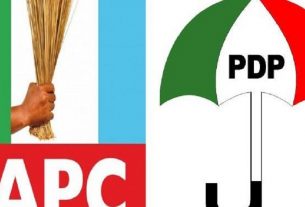By Emmanuel Aziken
It was understandable that the Tinubu Campaign Organisation was outraged over the outcome of the ANAP NOI polls that put Peter Obi as the leading candidate for the 2023 presidential election.
The study puts Obi as the choice of 21% of Nigerians with Asiwaju Bola Tinubu and Atiku Abubakar coming a joint second at 13%. Expectedly, the fourth candidate that has been on the radar, Senator Rabiu Kwankwaso came a distant fourth at 4%.
Reacting to the details of the poll that came out on Thursday, the Tinubu Campaign through Bayo Onanuga said:
“We are unperturbed by these dubious and unreliable statistics because our research shows that NOI Polls have been off the mark at critical election periods in recent times.”
The NOI poll is the brainchild of the ANAP Foundation, a body that has the integrity quotient of one of Nigeria’s leading and most industrious entrepreneurs, Atedo NA Peterside, after whose name the foundation derives its name.
Atedo Peterside has to his credit the honour of floating one of the earliest indigenous investment banks in the country, the Investment Banking and Trust Company, IBTC which became one of the legacy banks in the Stanbic IBTC banking group.
So, for an organization with the imprimatur of Atedo Peterside, it is not expected that the poll would come up with the kind of dirt that the Tinubu Campaign would want Nigerians to believe.
In its segmentation of the voting expectations, the NOI poll brought to bear what many believe will be the regional sentiments that will be a major factor in determining the next president of the country.
According to the poll, each of the three major candidates will take first in the consideration of voters in their various geopolitical zones.
In that direction, Tinubu is expected to garner 18% of the votes in the Southwest, Atiku Abubakar 28% in the Northeast and Peter Obi, a whopping 68% of the votes in the Southeast. What perhaps may have suppressed the expectation of Tinubu in the Southwest is the fact that at least 25% of voters in the region have not made up their minds as to who they would vote for.
This geopolitical expression is understandable. The fact that the Southeast is massively populated by the Igbo is a fact that favours Obi. Tinubu is also not helped by the fact that a significant proportion of the population of the Southwest is not Yoruba, thus the dilution of the proportion of those waving the ethnic flag in their support for him.
It is also very possible that the Muslim-Muslim ticket would weigh against Tinubu in the Christian belt of the Southwest, notably in Ondo and Ekiti States.
How do the candidates perform outside their home regions?
Peter Obi is first with 46% in the South-South and joint first with Tinubu in the North-Central. Atiku is also first in the Northwest.
Peter Obi’s ability to cross geopolitical boundaries understandably comes from his appeal to younger voters who may see him in a different light from the two veteran politicians, Atiku and Tinubu.
What should be troubling to the Atiku Campaign is the fact that the South-South that had until recently been the base of the party, according to the poll does not favour him. He is a distant second with 6% of the votes taking second to Obi. It is a result that is perplexing which would also make the Atiku Campaign to perhaps question the precision of the poll.
Another shocker from the poll is the claim that Tinubu would poll 0% in the Southeast. That may well be by way of approximation as it is near impossible for a candidate to score no vote. Perhaps that is the approximation of his estimated votes in percentage points.
However, it mirrors the seeming detachment between the people of the Southeast and the APC presidential candidate. On this page a week ago, the issue of the gulf between the APC presidential candidate and Ndigbo was rigorously interrogated.
Your correspondent had also reported that Tinubu did not traverse the Southeast in the course of his campaign for the presidential ticket of the APC. The nearest interface was the claim that he invited the Southeast delegates to meet him in Abuja.
Besides Obi making significant inroads into other regions, Atiku also expectedly did well in the Northwest pulling the highest proportion of votes in the region, 20%. Tinubu comes second with 15%, a fact that poohpoohs claims that the Northwest would reject Tinubu in favour of their kin, Atiku from the Northeast.
Even more significant for the Obidients, is the fact that Kwankwaso takes third in his zone with 9% of the votes, marginally ahead of Obi who came fourth with 8% of the votes. It would reassure the Obi-dient Nigerians that Kwankwaso is not being missed considering the disruption his emergence as running mate would have caused.
The poll also shows that the North-Central and North-West are about the most competitive zones for the candidates with the margin of lead not decisive. Obi and Tinubu are joint first with 16% of the votes with Atiku third 9% in North Central.
In the North-West, Atiku leads with 20% and Tinubu 15% while Kwankwaso, Obi trail at 9% and 8% respectively.
The poll’s result for the Southwest is shocking for Atiku with the PDP candidate garnering a mere 4% compared to the 18% and 12% garnered by Tinubu and Obi respectively.
However, what should console many of the candidates who do not appear to have been favoured is the fact that the majority of Nigerians are yet to make up the mind with 32% undecided and 15% refusing to give their preferences.
The Guardian





